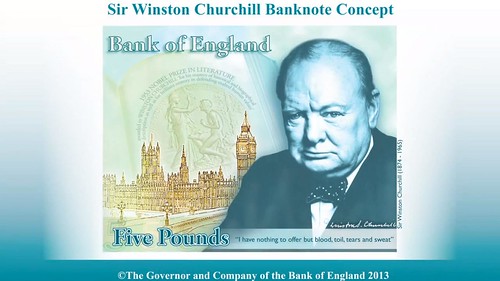Republished from Strategic Culture Foundation
On Churchill's Sinews of Peace
By Cynthia Chung, November 24, 2019
The West needs to wake up to what was implemented as foreign policy on the world after WWII and recognise it for what it was, as a sponsorship of fascism.
This past Nov. 9th marked the 30th anniversary of the fall of the Berlin Wall. It is a pivotal point in modern history, since it also marked the fall of the Iron Curtain. As is well known the Iron Curtain speech was made by then Prime Minister of Britain, Winston Churchill, on March 5th, 1946 at Westminster College in Fulton, Missouri. Ironically, the speech was named "Sinews of Peace". In this speech on the subject of "peace", Churchill announced to the world that the Soviet Union, less than one year after WWII had ended and the war against fascism had been won, with the instrumental backing by the Soviets, that suddenly the Soviets and anything considered under Soviet influence was to be cut out of the West and labelled both an enemy of the state and a threat to freedom and democracy. There was no reason given.
This threatening message was not only meant for the Soviets, but was also directed to the Americans and in between the lines Churchill stated "Things are going to be very different from now on. Your dead president cannot protect you any longer." Some may be surprised to hear such an aside comment, more likened to the outer ruminations of Shakespeare's Iago. Such confusion will be addressed shortly.
It is no secret that Churchill disliked Stalin, but this went further than an incompatibility in personalities. Churchill considered it below himself and Britain to 'discuss' or 'negotiate' with any non-Anglo Saxon country, especially not a country in Asia, Africa and South America. These were considered as either subject people or people that needed to be subjugated. In 1937 Churchill stated to the Palestine Royal Commission:
"I do not admit for instance, that a great wrong has been done to the Red Indians of America or the black people of Australia. I do not admit that a wrong has been done to these people by the fact that a stronger race, a higher-grade race, a more worldly wise race to put it that way, has come in and taken their place."
Some 'loyal' subjects of Britain maintain that Churchill was an honorable man. After all Churchill was voted as the greatest Briton ever in 2002 with the London Independent going so far as to say he was "crowned". These subjects of Churchill will deny the accusation that Churchill was a racist, but in the same breath will acknowledge that Churchill did believe in racial hierarchies and eugenics. There is apparently a difference between the two according to Churchill lovers. When Labour candidate Benjamin Whittingham tweeted that Churchill was "a racist and white supremacist" after it was announced that Churchill would feature on the new  �5 note, the comments were labelled as "ignorant" and "incredibly insulting" by Churchill's grandson Sir Nicholas Soames and the tweet was subsequently deleted with the Labour Party releasing a response that the comment did not represent the view of the Party. Apparently, thinking your race is superior to others and that this in turn justifies your subjugation and slaughter of said races, in addition to also believing that said races should be sterilised (which Churchill also unapologetically advocated)-- is not racist.
But the problem goes much further. There is no limit to how far one can decide to carry such a vision of imposing the will of a superior race onto what is considered to be an inferior race. Where does the line start where we begin to recognise another's peoples or country's right to sovereignty? And how far is one willing to disregard the other's sovereignty? Well the answer, in accordance with Churchill, is there is no line. It isn't even so simple as a question of being 'white' vs 'non-white', as history clearly testifies in the cases of the Irish and the Scottish people who suffered systemic genocides under British rule.
Franklin D. Roosevelt was undeniably a stabilising force of diplomacy between West vs East tension during WWII. Roosevelt was of the view that the "Big Four", consisting of the US, Britain, Soviet Union and China, should all have an equal seat at the table for discussing a post-WW II world. The plan under Roosevelt was that these nations, under the principles of the Atlantic Charter, were to be responsible for the formation of a United Nations, which would oversee the banishment of colonialism world-wide and would bring the power of technological advancement to all nations in its place. Roosevelt was of the view that all nations should be supported in their development in order to ensure lasting peace and avoid another world war, something that obviously clashed with the outlook of the British Empire who had only known a complete reliance on colonialism for the past centuries.
Elliott Roosevelt, who had reached the rank of Brigadier General during the war and was a trusted aid to his father, published a book titled "As He Saw It" in 1946, which is the most thorough documentation of FDR's anti-colonial post-war vision. Elliott was privy to many high security meetings, including conversations his father, Franklin D. Roosevelt, had in his home with Churchill. Notably in one part of the book Elliott recounts a discussion that occurred on August 10, 1941 on colonial issues:
"Of course," [FDR] remarked, with a sly sort of assurance, "of course, after the war, one of the preconditions of any lasting peace will have to be the greatest possible freedom of trade."
Churchill shifted in his armchair. "The British Empire trade agreements," he began heavily, "are-"
(Note: You can view every article as one long page if you sign up as an Advocate Member, or higher).








